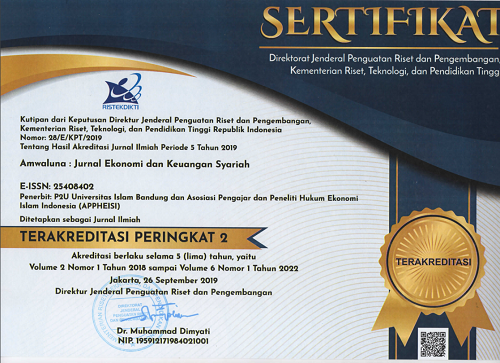BENEFITS OF FINANCIAL RATIOS FOR FINANCING SHARIA BANKING INDONESIA
Abstract
This study aims at how the benefits of financial ratios to Islamic banking financing in Indonesia. The data used is time-series data. Population, as well as samples in this study, are statistical reports of sharia banking Sharia Commercial Banks in Indonesia for the period January 2015 - December 2017. Ratio selection is conducted by using a stepwise regression method as well as hypothesis testing is done by multiple regression, t-test, and F test. The results obtained from the study show that the value of Adjusted R2 can obtain values of 0.914 or 91.40%. The t-test results show that FDR, NPF, and ROA significantly influence Sharia Banking Financing. This shows that from the financial ratios used in this study, three financial ratios that affect the Financing of Sharia Banking in Indonesia, namely FDR, NPF, and CAR.
Keywords
Full Text:
PDFReferences
Asyik, N. F., & Soelistyo, S. (2000). Kemampuan Rasio Keuangan dalam Memprediksi Laba (Penetapan Rasio Keuangan Sebagai Discriminator). Journal of Indonesian Economy and Business, 15(3), 313–331.
Donaldson, L., & Davis, H. J. (1989). Ceo governance and shareholder returns: Agency theory or stewardship theory [paper presented at annual meeting of the Academy of Management, Washington, DC]. Donaldson Washington, DC.
Ghozali, I. (2018). Aplikasi analisis multivariete dengan program IBM SPSS 23.
Horne, J. C. Van, & Wachowicz, J. M. (2012). Prinsip-prinsip manajemen keuangan. Jakarta: Salemba Empat.
Indonesia, B. (2012). Direktorat Perbankan Syariah Bank Indonesia. Kajian Model Bisnis Perbankan Syariah, Jakarta: Bank Indonesia.
Iqbal, M. (2018). Pengaruh Asean Economic Community (AEC) Terhadap Kinerja Perbankan Syariah Di Indonesia. Al-Amwal: Jurnal Ekonomi Dan Perbankan Syari’ah, 10(2), 158–168. https://doi.org/10.24235/amwal.v10i2.3361
Keuangan, O. J. (2017). Statistik Perbankan Syariah. 2016. Tersedia: Www. Ojk. Go. Id.[Diakses 28 September 2018].
Lukman. (2008). Pengaruh Kepemilikan Manajerial, Kepemilikan Institusional, dan Dividen Terhadap Kebijakan Utang Pada Perusahaan Yang Terdaftar Di Bursa Efek Jakarta. Wacana Ekonomika, 6(1).
Machfoedz, M. (1994). Financial ratio analysis and the prediction of earnings changes in Indonesia. Kelola, 7(3), 114–134.
Meckling, W. H., & Jensen, M. C. (1976). Theory of the firm: Managerial behavior, agency costs and ownership structure. Journal of Financial Economics, 3(4), 305–360.
Muhammad, H. M. S. (2004). Manajemen dana bank syariah. Ekonisia.
Nasional, B. P. P. (2018). Jumlah Penduduk Indonesia. Jakarta.
Nomor, U.-U. (21 C.E.). tahun 2008 tentang Perbankan Syariah.
Nurfauziah, Harjito, D. A., Ameliawati, H. . (2007). No Hubungan Kepemilikan Manajerial, Kepemilikan Institusi dan Kebijakan Utang dalam Perspektif Masalah Agensi Di IndonesiaTitle. VENTURA, 10(1).
Rahardjo, B. (2007). Keuangan dan Akuntansi untuk Manajer Non Keuangan. Yogyakarta: Graha Ilmu.
Suwamo, A. E. (2004). MANFAAT INFORMASI RASIO KEUANGAN DALAM MEMPREDIKSI PERUBAHAN LABA (Studi Empiris Terhadap Perusahaan Manufaktur Go Publik Di Bursa Efek Jakarta). Program Pasca Sarjana Universitas Diponegoro.
Wibowo, M. G. (2003). Pengaruh Suku bunga dan Jumlah bagi hasil terhadap Volume Mudhārabah di BMI tahun 1994-2001. Jurnal Muamalah, I.
DOI: https://doi.org/10.29313/amwaluna.v5i1.5299
Refbacks
- There are currently no refbacks.
Editorial Office:
Syariah Faculty, Universitas Islam Bandung
Jalan Tamansari No. 24-26 Kota Bandung

Amwaluna : Jurnal Ekonomi dan Keuangan Syariah is licensed under a Creative Commons Attribution-NonCommercial-ShareAlike 4.0 International License.







